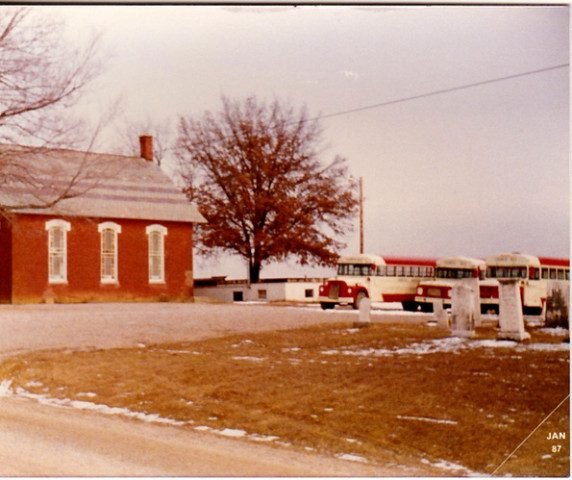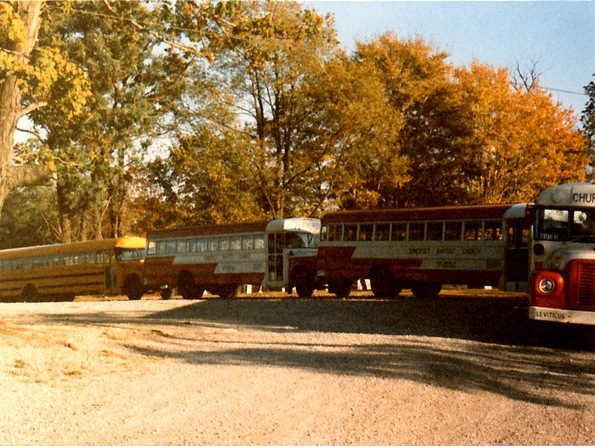
Earlier today, Troy left the following comment on the post titled IFB Church Movement: Win Them, Wet Them, Work Them, Waste Them:
I wonder if traditional cult-like tactics were ever used, like using a pretty girl as bait or targeting the lonely. Considering the goal was mere numbers rather than paying parishioners I’m guessing probably not.
Troy wanted to know if IFB churches targeted specific groups of people. The short answer is yes. While the goal was allegedly to win souls, it is hard not to conclude that many ministries in IFB churches were primarily used to drive church attendance.
In the mid-1980s, I pastored one of the largest non-Catholic churches in Perry County, Ohio. For a time, Somerset Baptist Church was booming. Everything seemed right. Sunday services were electric, with attendees actually excited about what was going on. The auditorium was packed, as was the junior church service in the annex. Even Sunday nights had an air of excitement. What was the driving force behind our church’s growth?
I started Somerset Baptist Church in July 1983. We immediately bought a dilapidated church bus from Faith Memorial Church in Lancaster. Faith Memorial, pastored by John Maxwell at the time, was one of the fastest growing churches in the country. We paid $200 for the bus.
We started busing children and adults to the church from Somerset and nearby rural communities. Two years later, with attendance in the 50s, we bought an abandoned United Methodist Church five miles east of town. Over the course of the next 18 months, we added three more buses to our fleet. On Sundays, buses from Somerset Baptist spread out over a three-county area picking up people for church. We also started running a bus route on Sunday night. It was not long, thanks to aggressive visitation tactics, promotions, and advertising, that our church buildings were overflowing with bus riders. Our goal was to win souls, but, damn, increased attendance numbers sure gave Pastor Bruce something to brag about. His dick was finally bigger than that of most of the IFB churches in the area.
I still remember the day we had our first attendance over 200. What a day. It was if the Shekinah glory of God had shined down upon my ministry! God was blessing all of my hard work. Two years later, attendance dropped to the low 70s. What happened?

The year church attendance hit 200, our annual income was $40,000 — the highest in the 11 years I was there. Fifty percent of our attendance came in on the buses. We had attracted a significant number of people from two local IFB churches that went through splits. Most of these people were middle-class wage earners, unlike the bus riders and the people who helped build the church. Before these people came on board, the highest wage earner in the church made $21,000 a year. Most of the families were on some sort of public assistance.
The families who found refuge at Somerset Baptist Church, bit by bit, returned to the churches they had left, taking their money with them. By the next year, our income had dropped in half. I was forced to stop the bus routes and sell off our fleet. And just like that, our glory days were over. By then, I had distanced myself from the IFB church movement, embraced Calvinism, and started a free Christian school for church children.
I felt like a failure. I had pastored a growing church, and now I was back to pastoring a small country church. As I was wont to do, I threw myself into a new ministry, the school. My goal was to raise new Calvinistic warriors for Christ. While I found great satisfaction in teaching the next generation of church members, I missed the days when our buses brought scores of people to church. Was I driven by a desire to win souls or attendance growth? Probably both. Even today, I find it hard to judge my motives.
I do know that I was taught at Midwestern Baptist College to use ministries to win souls and grow church attendance. Did soulwinning become before attendance? I want to think so, but after years spent hobnobbing with IFB preachers, I concluded that, for many pastors, it was all about the numbers. As I mentioned in IFB Church Movement: Win Them, Wet Them, Work Them, Waste Them, success was measured by attendance. Want to be respected and admired by your fellow preachers? Have big church attendance numbers. Want to be a conference speaker? Pastor a growing church.
I spent the first 32 years of my life in the IFB church movement. I saw all sorts of ministries used to build church attendance:
- Bus ministry
- Youth ministry
- Deaf ministry
- Senior ministry
- Retarded ministry (as it was called, at the time)
These types of ministries were typically frequented by lower-income people, people who were not going to put much money, if any, in the offering plate on Sundays. While their “souls” were certainly important, a fair-minded person would have to conclude that these ministries primarily existed to drive church attendance. Sure, attendees benefited from these ministries, but I suspect the real benefit went to pastors who could then brag about church attendance at the next preacher’s meeting. Polly and I were talking today about the bus ministry at Somerset Baptist. Why were mothers — it was almost ALWAYS mothers — so willing to let their children ride one of our buses? Simple. Their children would be gone for 3-5 hours. FREEDOM! By picking up their children, we provided free babysitting. We seemed to be “nice” people; why not let your children ride the bus with their friends? (And we really pushed riders to invite their friends, a subject I really must write about one of these days.)
Most IFB churches have abandoned their bus ministries. Years ago, the goal was quantity, but now that parents are not as likely to let their children ride a bus to church, and running a bus ministry is prohibitively expensive, pastors are focused on quality. No more snotty-nosed welfare kids running around the church, just tithing Jesus-lovers carrying leather-bound King James Bibles. If Jesus were alive today, I wonder what he would say? Suffer little children, and forbid them not, to come unto me: for of such is the kingdom of heaven. (Matthew 19:14)
Bruce Gerencser, 66, lives in rural Northwest Ohio with his wife of 45 years. He and his wife have six grown children and thirteen grandchildren. Bruce pastored Evangelical churches for twenty-five years in Ohio, Texas, and Michigan. Bruce left the ministry in 2005, and in 2008 he left Christianity. Bruce is now a humanist and an atheist.
Connect with me on social media:
Your comments are welcome and appreciated. All first-time comments are moderated. Please read the commenting rules before commenting.
You can email Bruce via the Contact Form.

Bruce, in other posts, you have described the ways in which religions are products of their cultures. This post is further evidence of that: Here in the US, we like to measure things or “use metrics.” Professors are voted for promotion or tenure based on how many journal articles they publish or how much grant money they bring to the institution; teachers are evaluated by their students’ test scores, workers are judged by how many or how much of whatever. So it was with your fellow pastors: How many people attended. How many souls were “saved”?
Whilst having massive doubts about my fervent fundyism around 2015, I came to a similar conclusion to you, Bruce, about church being used as a babysitter. I was praised for introducing a popular family evangelism project to our area of dying churches with no Sunday Schools. It’s called Messy Church. Families come along and get jesused as they craft, sing, play games with their kids and we thank the lord that they are HearingThe Gospel. I began to see that our good attendance was to some part due to there being not much else to do on a wet winter Sunday afternoon in our UK village. We had food at the end and, in some places apparently, Messy Church was a boon to separated dads who had their children at weekends, had little spare money to entertain or feed them, so got a nice free meal and entertainment with us. And far from being interested, parents snuck off to the back of the room and checked their phones whilst we crafted with or preached at their children. But on we jesused, mighty things were juuuust around the corner, local heathen were going to get converted in droves…..when I and a couple of other leaders coincidentally left around the same time, the project disappeared. I concluded god couldn’t have wanted converts very much, like he supposedly did, if such a promising project just folded so easily.
The more I read about your description of how churches conduct themselves, and certainly the way that you micromanaged the churches you pastored, the more I see how they are businesses. Perhaps that’s the problem. A business cannot, unless you’re a person offering a specialised service, such as a plumber or electrician, work via one person. There’ll be an ultimate boss, whatever his title is, but everything is delegated. The boss doesn’t buy the motor fleet the company needs, and certainly doesn’t do the driving. Marketing, advertising, accounting, personnel, etc, etc, are handled by others, with the boss having a role that understands all of these other functions but only limited involvement. The pastor of a large church surely needs to delegate in a similar way. If I were that pastor I’d have people helping write my sermons, testing and training me on delivery, plans for expanding with expert marketing and advertising experts, and so on. Of course, affording this in low income areas, with a product as uncertain as saving souls…well perhaps that’s the problem!
Churches operate based on their volunteers. I remember my grandparents trying their hardest to train me to be a church volunteer, but I hated it and wanted nothing to do with it. My first mutiny was refusing to volunteer in the kitchen at Vacation Bible School after I aged out – I was 13 and didn’t want to do it. That was my 1st successful open rebellion. They did make me run a Training Union class for preschoolers – my grandfather was supposed to be in charge, but what happened was that he left me alone with these little hellions, and I was 17 and had zero babysitting skills and didn’t like little kids. So he eventually found a replacement for us as I was barely able to keep the little hellions safely inside the room.
But yeah, it did seem like churches competed on numbers. And the small churches would try to say, “Well, we teach the Real Gospel, not like those big churches that are full of Lukewarm Christians”.